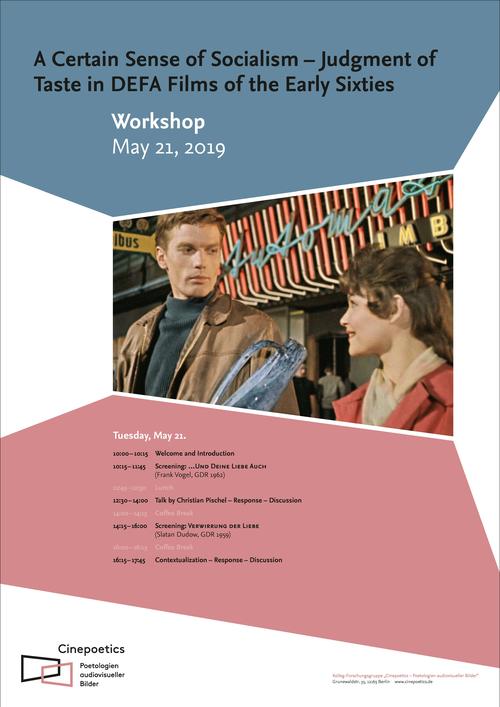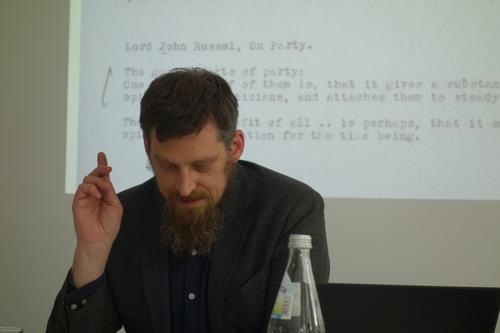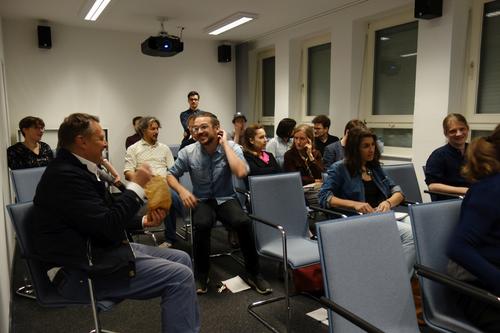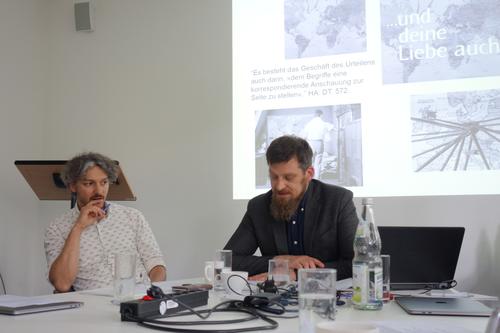A Certain Sense of Socialism: Judgment of Taste in DEFA Films of the Early Sixties
21.05.2019 | Workshop der Kolleg-Forschungsgruppe Cinepoetics mit Christian Pischel.
Research Focus: Shared Sensibilities
With many fellows present that are also part of the critical edition of Hannah Arendt's collected works, the workshop’s program formulated an informed perspective on judgment and film. After screening Frank Vogel's film …und deine Liebe auch (1962), Christian Pischel provided some insights into his research on DEFA films. He aims at connecting Hannah Arendt’s thoughts on the 'sensus communis' and the 'judgment of taste' with DEFA films from a post-war production period until the early 1960s. Pischel is interested in how the films before 1966 (the 11th plenary meeting of central committee in December 1965 led to a far more restrictive film culture in the GDR) transport a sense of neglecting and how socialism can be regarded as a sensible thing. Furthermore, he drew similarities between Arendt’s thoughts on judgment – as formulated by Florian Klinger – and Cinepoetics' involvement with metaphor theory.
Pischel then laid emphasis on the fabrication of a world of appearances as a basis for judging – in the film's characters as well as the viewers. Social realism remains a big influence on these aesthetic processes in early DEFA films, which Pischel described as a stylistic leftover from the revolutionary films of Soviet directors. While …und deine Liebe auch links Berlin as a social space to a certain depiction of it as idyllic, the film can be seen as a first step of normalizing the Berlin Wall, which is shown in fabrication during the first half of the film.
In his response to Pischel's talk, Matthias Grotkopp focused on the notion of the 'world spectator' as one in its own community. The social space created here is an example of the Arendtian expression of 'acting in concert' that negates a precise answer to the question of violence or power – of the Berlin Wall being a mere 'wall' or an 'anti-fascist protective rampart.' The limits of one's world are constantly redefined; however, the film's protagonist as an affective center of attraction strictly addresses his peers (and the viewers): "Es muss Grenzen geben!" ("There have to be limits/borders!") The following discussion in the group brought out several inspirations for further work on the film. Especially with a focus on the emotional and sensible side of the depicted socialism (public/private love), the perspective of the omniscient narrator looking back, and the many different stylistic 'particles' of other genres.
The second session of the day consisted of a screening of Slatan Dudow's Verwirrung der Liebe (1959) as well as two short presentations. Christian Pischel provided an historic perspective into the critical perception of Dudow's film. While most of the GDR's press organs gave positive reviews that underlined the pursuit for 'the' socialist comedy, others found faults with the daft humor of this Shakespearian comedy of errors set in the student milieu. In her response, Eileen Rositzka foregrounded this relation to the British playwright's work "A Midsummer Night’s Dream." Furthermore, she drew comparisons to another DEFA film, namely Konrad Wolf's Der geteilte Himmel (1964), and its visual expression of the German homonym 'teilen', which means separating as well as sharing.
Rositzka also linked Dudow's film with a West-German equivalent, Helmut Käutner's Die Zürcher Verlobung (1957), which shows a similar approach to the relation of carnevalesque bedlam and a world of duty and obligation. Among other aspects, the group's discussion highlighted the film's conceptual contradictions and transitional spaces, which, in turn, inspired further thoughts on the genre characteristics of a 'socialist film comedy.'



